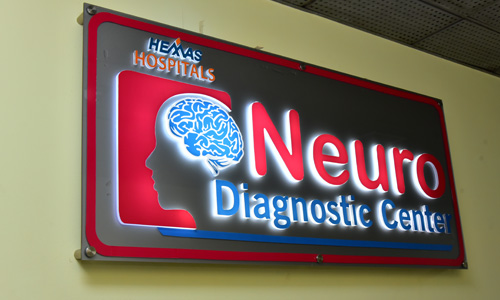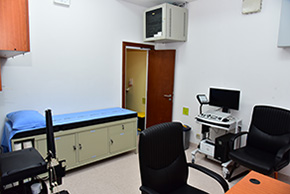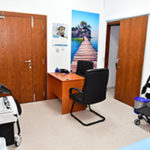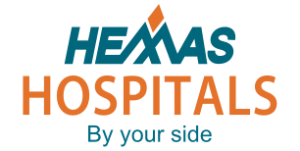
Hemas Neuro Diagnostic Center
What is Neuro Diagnostics?
Neuro Diagnostics is the field of medicine that aids in the diagnosis of conditions related to the nervous system. A neurodiagnostic center is responsible for performing and analyzing the investigations which aid in this diagnosis. The nervous system in the human body consists of the central nervous system which is the brain and spinal cord, as well as the peripheral nervous system which includes the nerves that run throughout the body. Investigations pertaining to the nervous system may be requested as part of assessing your neurological system and include a number of investigations and diagnostic tools such as EEG (Electroencephalogram which helps monitor the electrical activity of the brain), Neuromonitoring during surgery, Sleep studies or Polysomnograms (which help to monitor the activity of the brain during sleep), and Nerve Conduction studies.
Why Hemas Neuro Diagnostic center?
Hemas Neuro Diagnostic Centre, one of the best in Sri Lanka offers you a wide range of services dedicated to assisting physicians with the diagnosis and treatment of neurological conditions. With state-of-the-art equipment and a pool of skilled doctors and technicians with decades of experience, the medical expertise we offer is second to none. Delivering all the neurodiagnostic services under one roof, Hemas Neuro Diagnostic Center prides itself on patient-oriented services that are of the highest quality.


Services we offer:
Hemas Neuro Diagnostic Centre offers you a wide range of services dedicated to assisting physicians with the diagnosis and treatment of neurological conditions which also include behavioral and psychiatric disorders.
Electromyography/Nerve Conduction Study (EMG/NCV):
An Electromyography (EMG) and Nerve Conduction Study (NCV) are investigations that assess the electrical activity of the nerves, muscles, and the neuromuscular junction. Recording the electrical activity in these regions will help to diagnose conditions that give rise to abnormal electrical activity, resulting in neuromuscular disease.
Neuromuscular diseases which can be diagnosed using an EMG/NCV include:
- Muscular dystrophy
- Congenital, mitochondrial, and metabolic myopathies
- Myotonias
- Compression neuropathies, such as carpal tunnel syndrome
- Peripheral neuropathies
- Radiculopathies
- Nerve lesions
- Amyotrophic lateral sclerosis (Lou Gehrig’s disease)
- Polio
- Spinal muscular atrophy
- Guillain-Barre syndrome
- Ataxias
- Myasthenia
Electroencephalogram (EEG)
An electroencephalogram (EEG) is a study of the electrical activity which occurs within the brain. It makes use of special sensors known as electrodes which are attached to the surface of your head in order to measure and record the electrical activity of your brain. These electrodes are connected by wires to a computer which then helps with recording this electrical activity, either on a screen or on paper in the form of a wave pattern. By looking at the height, frequency, and shape of the waves your doctor will be able to detect any abnormality in the electrical activity of the brain. This test is used to diagnose conditions such as seizure disorder and syncope which results because of a change in the pattern of the brain’s electrical activity.
An electroencephalogram (EEG) may be requested for:
- The diagnosis of epilepsy and to determine the type of epilepsy one may be suffering from. An EEG is considered the gold standard investigation in helping to diagnose epilepsy.
- The identification of the location of diseases of the brain such as a brain tumor, infection, or inflammation of the brain matter (such as encephalitis or meningitis), bleeding, head injury and Parkinson’s disease.
- The evaluation of syncopal attacks (fainting spells) or dementia.
- Helping to predict an individual’s chance of recovery following a change in the level of consciousness.
- Helping to confirm or rule out brain death in an individual diagnosed to be in a coma.
- Studying sleep disorders, such as narcolepsy.
- Monitor the activity of the brain while an individual is receiving general anesthesia during surgery.
Sleep Studies:
A sleep study also called polysomnography (PSG) is an investigation which aids with the diagnosis of sleep-related disorders. Various physical parameters, including the brain’s electrical activity, level of oxygen in your blood, heart rate, and respiratory rate are all recorded electronically while you sleep. These recordings are then analyzed by a qualified sleep specialist to determine if you have a sleep disorder.
Sleep studies can help diagnose:
- Sleep-related breathing disorders, such as sleep apnea
- Sleep-related seizure disorders
- Sleep-related movement disorders, such as periodic limb movement disorder
- Sleep disorders that cause extreme daytime sleepiness/tiredness, such as narcolepsy
Other services we offer at Hemas Neuro Diagnostic Center include:
Brain Stem Evoked Response (BSER) Test:
The BSER is a test that helps to assess an individual’s hearing. Here we measure the response of the brainstem to varying intensities of sound and assess the auditory (hearing) pathways of the brainstem.
Visual Evoked Potential (VEP) Test:
Is a test that helps to assess vision and the visual pathway leading up to the brain. This test determines the integrity of nerve transmission from the eye to the brain
Somatosensory Evoked Potential (SEP) Test:
This is a test used to determine the electrical activity of the brain which results from the stimulation of touch.
Electrooculography (EOG) Test:
Electrooculography is a test used for measuring what is known as the corneo-retinal standing potential, which is a measure of the pressure that exists between the front and the back of the human eye.
For More information and Appointments contact us:
Telephone: 0778 705 888
Email: info@hemashospitals.com
Address: No.389, Negombo Road,Wattala.
